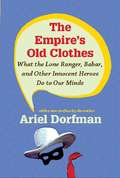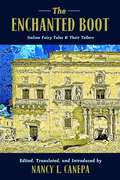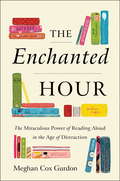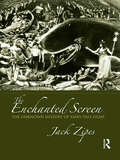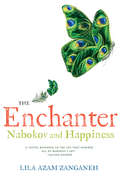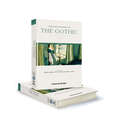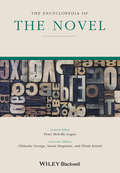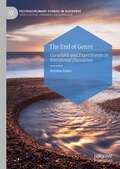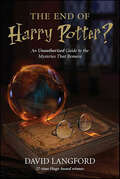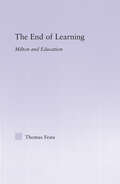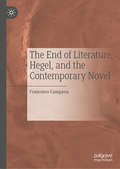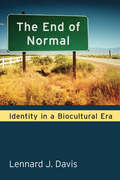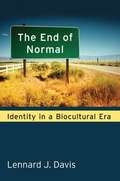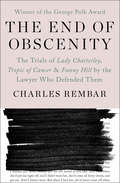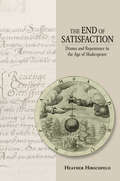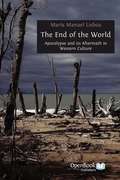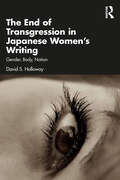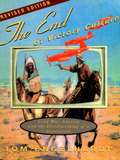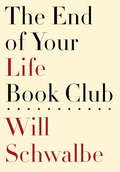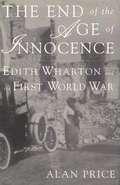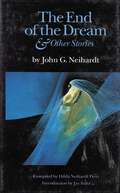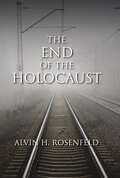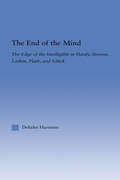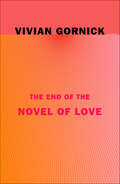- Table View
- List View
The Empire's Old Clothes: What the Lone Ranger, Babar, and Other Innocent Heroes Do to Our Minds
by Ariel DorfmanIn this powerful cultural critique, Ariel Dorfman explores the political and social implications of the smiling faces that inhabit familiar books, comics, and magazines. He reveals the ideological messages conveyed in works of popular culture such as the Donald Duck comics, the Babar children's books, and Reader's Digest magazine. The Empire's Old Clothes was widely praised when it was first published in 1983. This edition, including a new preface by the author, makes a contemporary classic newly available.
The Enchanted Boot: Italian Fairy Tales and Their Tellers (The Donald Haase Series in Fairy-Tale Studies)
by Prof. Nancy L. CanepaThis comprehensive collection of Italian tales in English encourages a revisitation of the fairy-tale canon in light of some of the most fascinating material that has often been excluded from it. In the United States, we tend to associate fairy tales with children and are most familiar with the tales of the Brothers Grimm, Hans Christian Anderson, and Disney. But the first literary fairy tales appeared in Renaissance Italy, and long before the Grimms there was already a rich and sophisticated tradition that included hundreds of tales, including many of those today considered "classic." The authors featured in this volume have, over the centuries, explored and interrogated the intersections between elite and popular cultures and oral and literary narratives, just as they have investigated the ways in which fairy tales have been and continue to be rewritten as expressions of both collective identities and individual sensibilities. The fairy tale in its Italian incarnations provides a striking example of how this genre is a potent vehicle for expressing cultural aspirations and anxieties as well as for imagining different ways of narrating shared futures.
The Enchanted Hour: The Miraculous Power of Reading Aloud in the Age of Distraction
by Meghan Cox Gurdon'As soon as I began to read, I was filled with that kind of engrossed blossoming that happens somewhere inside of you when you start a really nourishing book.' - Pandora SykesA conversation-changing look at the social, familial, neurological, and psychological benefits of reading aloud, especially for parents and children. A miraculous alchemy occurs when one person reads to another, transforming the simple stuff of a book, a voice, and a bit of time into complex and powerful fuel for the heart, brain, and imagination. Grounded in the latest neuroscience and behavioural research, and drawing widely from literature, The Enchanted Hour explains the dazzling cognitive and social-emotional benefits that await children who are read to, whatever their class, nationality or family background. Meghan Cox Gurdon argues that this ancient practice is a fast-working antidote to the fractured attention spans, atomized families and unfulfilling ephemera of the tech era, helping to replenish what our devices are leaching away. For everyone, reading aloud engages the mind in complex narratives; for children, it's an irreplaceable gift that builds vocabulary, fosters imagination, and kindles a lifelong appreciation of language, stories and pictures.Bringing together the latest scientific research, practical tips, and reading recommendations, The Enchanted Hour will both charm and galvanize, inspiring readers to share this invaluable, life-altering tradition with the people they love most.
The Enchanted Screen: The Unknown History of Fairy-Tale Films
by Jack ZipesThe Enchanted Screen: The Unknown History of Fairy-Tale Films offers readers a long overdue, comprehensive look at the rich history of fairy tales and their influence on film, complete with the inclusion of an extensive filmography compiled by the author. With this book, Jack Zipes not only looks at the extensive, illustrious life of fairy tales and cinema, but he also reminds us that, decades before Walt Disney made his mark on the genre, fairy tales were central to the birth of cinema as a medium, as they offered cheap, copyright-free material that could easily engage audiences not only though their familiarity but also through their dazzling special effects. Since the story of fairy tales on film stretches far beyond Disney, this book, therefore, discusses a broad range of films silent, English and non-English, animation, live-action, puppetry, woodcut, montage (Jim Henson), cartoon, and digital. Zipes, thus, gives his readers an in depth look into the special relationship between fairy tales and cinema, and guides us through this vast array of films by tracing the adaptations of major fairy tales like "Little Red Riding Hood," "Cinderella," "Snow White," "Peter Pan," and many more, from their earliest cinematic appearances to today. Full of insight into some of our most beloved films and stories, and boldly illustrated with numerous film stills, The Enchanted Screen, is essential reading for film buffs and fans of the fairy tale alike.
The Enchanter: Nabokov and Happiness
by Lila Azam ZanganehDiscovering happiness in reading the work of an extraordinary writer. The protagonist of Vladimir Nabokov's The Gift playfully dreamed of writing "A Practical Handbook: How to Be Happy." Now, Nabokov's own creative reader Lila Azam Zanganeh lends life to this vision with sly sophistication and ebullient charm, as she shares the delirious joy to be found in reading the masterpieces of "the great writer of happiness." Plunging into the enchanted and luminous worlds of Speak, Memory; Ada, or Ardor; and the infamous Lolita, Azam Zanganeh seeks out the Nabokovian experience of time, memory, sexual passion, nature, loss, love in all its forms, and language in all its allusions. She explores Nabokov's geography-from his Russian childhood to the landscapes of "his" America-suffers encounters with his beloved "nature," hallucinates an interview with the master, and seeks the "crunch of happiness" in his singular vocabulary. This beautifully illuminated book will both reignite the passion of experienced Nabokovians and lure the innocent reader to a well of delights as yet unseen.
The Encyclopedia of the Gothic, 2 Volumes
by Andrew Smith William Hughes David PunterThe Encylopedia of the Gothic features a series of newly-commissioned essays from experts in Gothic studies that cover all aspects of the Gothic as it is currently taught and researched, along with the development of the genre and its impact on contemporary culture. Comprises over 200 newly commissioned entries written by a stellar cast of over 130 experts in the field Arranged in A-Z format across two fully cross-referenced volumes Represents the definitive reference guide to all aspects of the Gothic Provides comprehensive coverage of relevant authors, national traditions, critical developments, and notable texts that define, shape, and inform the genre Extends beyond a purely literary analysis to explore Gothic elements of film, music, drama, art, and architecture. Explores the development of the genre and its impact on contemporary culture
The Encyclopedia of the Novel (Wiley-Blackwell Encyclopedia of Literature)
by Susan Hegeman Efraín Kristal Olakunle George Peter Melville LoganNow available in a single volume paperback, this advanced reference resource for the novel and novel theory offers authoritative accounts of the history, terminology, and genre of the novel, in over 140 articles of 500-7,000 words. Entries explore the history and tradition of the novel in different areas of the world; formal elements of the novel (story, plot, character, narrator); technical aspects of the genre (such as realism, narrative structure and style); subgenres, including the bildungsroman and the graphic novel; theoretical problems, such as definitions of the novel; book history; and the novel's relationship to other arts and disciplines. The Encyclopedia is arranged in A-Z format and features entries from an international cast of over 140 scholars, overseen by an advisory board of 37 leading specialists in the field, making this the most authoritative reference resource available on the novel. This essential reference, now available in an easy-to-use, fully indexed single volume paperback, will be a vital addition to the libraries of literature students and scholars everywhere.
The End of Genre: Curations and Experiments in Intentional Discourses (Postdisciplinary Studies in Discourse)
by Brenton FaberThis book explores early new critical debates about intention, tracing how and why intention was dismissed across much humanities scholarship, and how it can be revisited and made relevant as a key formative, evaluative, and ethical concept. The author argues that the academic disinterest in intention occurred simultaneously as genre criticism and later the rhetorical interest in genre came into its own. Genre became a way to simultaneously elide and naturalize intention. The book elaborates on the pedagogical, ethical, and empirical consequences naturalizing intention through genre has had for rhetorical studies and it offers a new term, “curations” to identify discursive forms, actions, and intentions working simultaneously. Finally, he also examines the gap between the humanities and STEM fields and shows specific ways scientists and engineers have called for the humanities to become more invested in intention as both a critical and an operational concept. This book will be of interest to students and scholars of discourse studies and critical discourse analysis, rhetoric and professional communication, including those in fields such as medicine, engineering, STS and business studies.
The End of Harry Potter?: An Unauthorized Guide to the Mysteries That Remain
by David LangfordIn The End of Harry Potter?, David Langford—Potter fan and award-winning writer—examines the many mysteries that remained unsolved prior to publication of the final volume of J. K. Rowling's magical series.The publication of Harry Potter and the Deathly Hallows, the seventh and final Harry Potter novel, was one of the most eagerly anticipated events in the history of publishing. Even the smallest hints from the author about what may happen to Harry and his friends generated major news stories.Is Albus Dumbledore really dead?Whose side is Severus Snape really on?What are the remaining horcruxes, where He Who Shall Not Be Named has stashed his soul?Does Harry bear a part of the Dark Lord's soul in his scar, and is this why he understands Parseltongue?In this highly entertaining book, Langford uses his deep knowledge of the six published Harry Potter novels to explore these and other mysteries, and to present a selection of possible outcomes.While Harry Potter and the Deathly Hallows may lay these questions to rest, Potter fans will still find David Langford's book enchanting and thought-provoking, and a perfect way to refresh their memory of the first six books in this beloved series.At the Publisher's request, this title is being sold without Digital Rights Management Software (DRM) applied.
The End of Learning: Milton and Education (Studies in Major Literary Authors)
by Thomas FestaThis book shows that education constitutes the central metaphor of John Milton's political as well as his poetic writing. Demonstrating how Milton's theory of education emerged from his own practices as a reader and teacher, this book analyzes for the first time the relationship between Milton's own material habits as a reader and his theory of the power of books. Milton's instincts for pedagogy, and the habits of inculcation everywhere visible in his writings, take on a larger political function in his use of education as a trope for the transmission of intellectual history. The book therefore analyzes Paradise Lost in the complementary contexts of its outright educational claims and more subversive countervailing measures in order to show how Milton dramatizes "the end of learning," which is to say both its objective and its failure. The thesis emphasizes the argumentative resourcefulness of Milton's efforts to liberate readers from the tyrannical bonds of their political innocence, most immediately in the context of the failure of Cromwell's regime to establish lasting republican institutions. More philosophically, the book explores the ways in which Milton's works investigate the humane and intellectual yearning for justice in response to the problem of evil.
The End of Literature, Hegel, and the Contemporary Novel
by Francesco CampanaThis book explores the concept of the end of literature through the lens of Hegel's philosophy of art. In his version of Hegel's 'end of art' thesis, Arthur Danto claimed that contemporary art has abandoned its distinctive sensitive and emotive features to become increasingly reflective. Contemporary art has become a question of philosophical reflection on itself and on the world, thus producing an epochal change in art history. The core idea of this book is that this thesis applies quite well to all forms of art except one, namely literature: literature resists its 'end'.Unlike other arts, which have experienced significant fractures in the contemporary world, Campana proposes that literature has always known how to renew itself in order to retain its distinguishing features, so much so that in a way it has always come to terms with its own end. Analysing the distinct character of literature, this book proposes a new and original interpretation of the 'end of art' thesis, showing how it can be used as a key conceptual framework to understand the contemporary novel.
The End of Normal: Identity in a Biocultural Era
by Lennard DavisIn an era when human lives are increasingly measured and weighed in relation to the medical and scientific, notions of what is "normal" have changed drastically. While it is no longer useful to think of a person's particular race, gender, sexual orientation, or choice as "normal," the concept continues to haunt us in other ways. In The End of Normal, Lennard J. Davis explores changing perceptions of body and mind in social, cultural, and political life as the twenty-first century unfolds. The book's provocative essays mine the worlds of advertising, film, literature, and the visual arts as they consider issues of disability, depression, physician-assisted suicide, medical diagnosis, transgender, and other identities. Using contemporary discussions of biopower and biopolitics, Davis focuses on social and cultural production--particularly on issues around the different body and mind. The End of Normal seeks an analysis that works comfortably in the intersection between science, medicine, technology, and culture, and will appeal to those interested in cultural studies, bodily practices, disability, science and medical studies, feminist materialism, psychiatry, and psychology.
The End of Normal: Identity in a Biocultural Era
by Lennard J. DavisIn The End of Normal, Lennard J. Davis explores changing perceptions of body and mind in social, cultural, and political life as the twenty-first century unfolds. The book’s provocative essays mine the worlds of advertising, film, literature, and the visual arts as they consider issues of disability, depression, physician-assisted suicide, medical diagnosis, transgender, and other identities.
The End of Obscenity: The Trials of Lady Chatterley, Tropic of Cancer & Fanny Hill by the Lawyer Who Defended Them
by Charles RembarWinner of the George Polk Award: Charles Rembar's illuminating account of overturning America's obscenity laws and protecting literature from censorship Up until the 1960s, depending on your state of residence, your copy of Henry Miller's Tropic of Cancer might be seized by the US Postal Service before reaching your mailbox. Selling copies of Cleland's Fanny Hill in your bookstore was considered illegal. Lady Chatterley's Lover by D. H. Lawrence was, according to the American legal system, pornography with no redeeming social value. Today, these novels are celebrated for their literary and historic worth. The End of Obscenity is Charles Rembar's account of successfully arguing the merits of such great works of literature in front of the Supreme Court. As the lead attorney on the case, he--with the support of a few brave publishers--changed the way Americans read and honor books, especially the controversial ones. Filled with insight from lawyers, justices, and the authors themselves, The End of Obscenity is a lively tour de force. Racy testimony and hilarious asides make Rembar's memoir not only a page-turner but also an enlightening look at the American legal system.
The End of Satisfaction: Drama and Repentance in the Age of Shakespeare
by Heather HirschfeldIn The End of Satisfaction, Heather Hirschfeld recovers the historical specificity and the conceptual vigor of the term “satisfaction” during the sixteenth and early seventeenth centuries. Focusing on the term’s significance as an organizing principle of Christian repentance, she examines the ways in which Shakespeare and his contemporaries dramatized the consequences of its re- or de-valuation in the process of Reformation doctrinal change. The Protestant theology of repentance, Hirschfeld suggests, underwrote a variety of theatrical plots “to set things right” in a world shorn of the prospect of “making enough” (satisfacere).Hirschfeld’s semantic history traces today’s use of “satisfaction”—as an unexamined measure of inward gratification rather than a finely nuanced standard of relational exchange—to the pressures on legal, economic, and marital discourses wrought by the Protestant rejection of the Catholic sacrament of penance (contrition, confession, satisfaction) and represented imaginatively on the stage. In so doing, it offers fresh readings of the penitential economies of canonical plays including Dr. Faustus, The Revenger’s Tragedy, The Merchant of Venice, and Othello; considers the doctrinal and generic importance of lesser-known plays including Enough Is as Good as a Feast and Love’s Pilgrimage; and opens new avenues into the study of literature and repentance in early modern England.
The End of The World: Apocalypse And Its Aftermath In Western Culture
by Maria Manuel LisboaOur fear of the world ending, like our fear of the dark, is ancient, deep-seated and perennial. It crosses boundaries of space and time, recurs in all human communities and finds expression in every aspect of cultural production - from pre-historic cave paintings to high-tech computer games. This volume examines historical and imaginary scenarios of apocalypse, the depiction of its likely triggers, and imagined landscapes in the aftermath of global destruction. Its discussion moves effortlessly from classic novels including Aldous Huxley's Brave New World, George Orwell's Nineteen Eighty-Four and Margaret Atwood's Oryx and Crake, to blockbuster films such as Blade Runner, Armageddon and Invasion of the Body Snatchers. Lisboa also takes into account religious doctrine, scientific research and the visual arts to create a penetrating, multi-disciplinary study that provides profound insight into one of Western culture's most fascinating and enduring preoccupations.
The End of Transgression in Japanese Women’s Writing: Gender, Body, Nation
by David S. HollowayThis book argues for a new articulation of the ways in which transgression is theorized in contemporary literature by Japanese women.Exploring the rhetorical and discursive mechanics of literary “bad girls” from fiction produced during the millennial turn (1990–2010), the book contends that women writers today deploy truant, unruly, restless, and aggressive female protagonists not to challenge the status quo but rather to reaffirm it. While Japanese women’s fiction has long been invested in cultivating an uncomfortable politics of opposition through “unladylike” themes such as sex, sexuality, and violence, the book argues that today authors turn to such acts of defiance to quietly advocate for the primacy of Japanese social order. Showing how transgression has not only lost its political and disruptive valence in contemporary women’s fiction, this book further reveals how discourses of dissent can be retooled to promote a conservative worldview.A fascinating literary analysis which reads Japanese literature in relation to the receding value of rebellion today, this book will be of huge interest to students and scholars of Japanese literature, gender, and cultural studies.
The End of Victory Culture: Cold War America and the Disillusioning of a Generation
by Tom EngelhardtIn a substantial new afterword to his classic account of the collapse of American triumphalism in the wake of World War II, Tom Engelhardt carries that story into the twenty-first century. He explores how, in the aftermath of September 11, 2001, the younger George Bush headed for the Wild West (Osama bin Laden, "Wanted, Dead of Alive"); how his administration brought "victory culture" roaring back as part of its Global War on Terror and its rush to invade Saddam Husseins's Iraq; and how, from its "Mission Accomplished" moment on, its various stories of triumph crashed and burned in that land.
The End of Your Life Book Club
by Will Schwalbe"What are you reading?" That's the question Will Schwalbe asks his mother, Mary Anne, as they sit in the waiting room of the Memorial Sloan-Kettering Cancer Center. In 2007, Mary Anne returned from a humanitarian trip to Pakistan and Afghanistan suffering from what her doctors believed was a rare type of hepatitis. Months later she was diagnosed with a form of advanced pancreatic cancer, which is almost always fatal, often in six months or less. This is the inspiring true story of a son and his mother, who start a "book club" that brings them together as her life comes to a close. Over the next two years, Will and Mary Anne carry on conversations that are both wide-ranging and deeply personal, prompted by an eclectic array of books and a shared passion for reading. Their list jumps from classic to popular, from poetry to mysteries, from fantastic to spiritual. The issues they discuss include questions of faith and courage as well as everyday topics such as expressing gratitude and learning to listen. Throughout, they are constantly reminded of the power of books to comfort us, astonish us, teach us, and tell us what we need to do with our lives and in the world. Reading isn't the opposite of doing; it's the opposite of dying. Will and Mary Anne share their hopes and concerns with each other--and rediscover their lives--through their favorite books. When they read, they aren't a sick person and a well person, but a mother and a son taking a journey together. The result is a profoundly moving tale of loss that is also a joyful, and often humorous, celebration of life: Will's love letter to his mother, and theirs to the printed page. This eBook edition includes a Reading Group Guide.
The End of the Age of Innocence: Edith Wharton and the End of the First World War
by Alan PriceEvaluation of her work.
The End of the Age of Innocence: Edith Wharton and the First World War
by Alan PriceThis book provides an overview of Wharton's life during World War II and how the war affected her writing and world-view. This book includes extensive new information on Wharton - based upon her unpublished letters, archival materials, and the extensive research by the author.
The End of the Dream and Other Stories
by John G. NeihardtOriginally published at the beginning of the twentieth century, the short stories of John G. Neihardt deserve to be better known. Their flesh-and-blood Indians were practically unprecedented in an era when the fiends of dime novels and idealizations of Cooper were still the literary norm. Owing much to young Neihardt's intimate association with the Omahas at their reservation in eastern Nebraska, the stories were of an Indian cast that perplexed the critics. They were often overlooked as the years brought laurels to the author of A Cycle of the West and Black Elk Speaks. A closer look at them reveals that Neihardt was a disciplined artist from the very beginning.The nine stories in this volume appeared from 1901 to 1905 in the Overland Monthly; five were collected in The Lonesome Trail in 1907. All of them are informed by Neihardt's experience among Omaha Indians and shaped by the power of his imagination. Except for "A Prairie Borgia," which clearly touches on the notorious Chief Blackbird's relations with traders, all are set in the time before contact with white men. Love and hate, kindness and cruelty, hope and despair, generosity and envy, honesty and guile, spiritual impulse and sexual desire operate in this wholly Indian world. "The End of the Dream," 'The Triumph of Seha," and "The Smile of God" are patterned on vision quests issuing in profound irony. The social outcast who figured in Neihardt's Indian Tales and Others (1927, a Bison Book), appears again in adventures with a cosmic, and sometimes fantastic, dimension. These stories, as well as "When the Snows Drift," "The Beating of the War Drums," "The Fading of Shadow Flower," "The Singing of the Frogs," and "The Spirit of Crow Butte," have an inwardness reflected by vivid imagery. Their quality led Dr. Susan LaFlesche Picotte, the daughter of Joseph LaFlesche (Iron Eyes), last chief of the Omahas, to exclaim that Neihardt was the only writer in a long line extending from Cooper to Frederic Remington who possessed "a true understanding of Indian character."The stories were compiled by Neihardt's daughter, Hilda Neihardt Petri. In his introduction Jay Fultz discusses their cultural context and artistic integrity.
The End of the Holocaust
by Alvin H. RosenfeldIn this provocative work, Alvin H. Rosenfeld contends that the proliferation of books, films, television programs, museums, and public commemorations related to the Holocaust has, perversely, brought about a diminution of its meaning and a denigration of its memory. Investigating a wide range of events and cultural phenomena, such as Ronald Reagan's 1985 visit to the German cemetery at Bitburg, the distortions of Anne Frank's story, and the ways in which the Holocaust has been depicted by such artists and filmmakers as Judy Chicago and Steven Spielberg, Rosenfeld charts the cultural forces that have minimized the Holocaust in popular perceptions. He contrasts these with sobering representations by Holocaust witnesses such as Jean Améry, Primo Levi, Elie Wiesel, and Imre Kertész. The book concludes with a powerful warning about the possible consequences of "the end of the Holocaust" in public consciousness.
The End of the Mind: The Edge of the Intelligible in Hardy, Stevens, Larking, Plath, and Gluck (Literary Criticism and Cultural Theory)
by DeSales HarrisonFirst Published in 2005. Routledge is an imprint of Taylor & Francis, an informa company.
The End of the Novel of Love
by Vivian GornickA finalist for the National Book Critics Circle Award for Criticism that explores the meaning of love and marriage as literary themes in the twentieth century.In The End of the Novel of Love, an acclaimed and provocative collection of criticism, Gornick applies the same intelligence, honesty, and insight that define her memoirs to an analysis of love and marriage as literary themes in the twentieth century. She examines the work and lives of several authors she admires—including Grace Paley, Willa Cather, Jean Rhys, George Meredith, Jane Smiley, Richard Ford, and Andre Dubus—to ultimately posit that love, sexual fulfillment, and marriage are now exhausted as the metaphorical expressions of success and happiness.Spanning the depths of common experience and the expanse of twentieth century literature, Gornick crafts an argument that is as defined by discourse as it is by the power of her language, which is gracefully poised between objective knowledge and subjective experience. In these eleven essays, she comes to see that, for most writers, like most readers, it is the drama of our angry and frightened selves in the presence of love that is our modern preoccupation. The End of the Novel of Love is a strikingly original and thought-provoking collection from a canonical critic.“Reading her essays, one is reassured that the conversation between life and literature is mutually sustaining as well as mutually corrective.” —The New York Times Book Review“Small in bulk but large in implication. The book is a pleasure and a stimulus: persuasive, finely wrought, quivering with intelligence.” —George Scialabba, Boston Review“An exceptionally well-written, original, and thought-provoking set of essays.” —Kirkus Reviews
